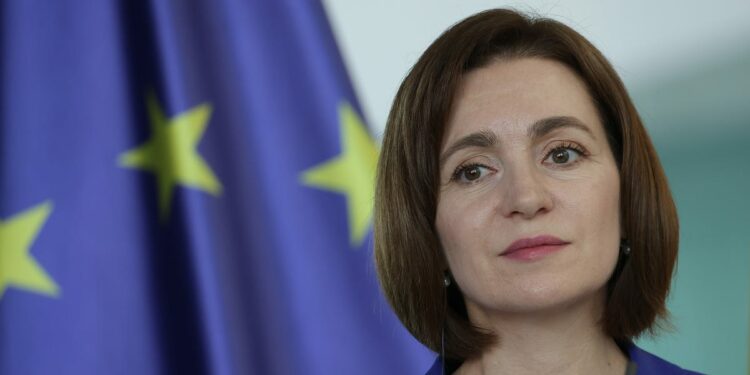Share
IN THE CASES OF UKRAINE, Georgia, and Moldova, the root cause of the complexity of European integration is Russia. Ukraine’s European accession depends on its ability to remain a viable state in the face of Russia’s onslaught. The Georgian Dream Party accuses the pro-Western opposition of being part of the “Global War Party” and trying to drag Georgia into a direct military confrontation with Russia, which still occupies about a fifth of Georgian territory and controls Georgian politics through the oligarch Bidzina Ivanishvili. Moldovans remain deeply attached to the idea of “neutrality” embedded in their constitution and treat it as a security guarantee in and of itself. While support for EU accession is high, many are aware that it was an EU association agreement, not NATO membership, that precipitated Russia’s 2014 invasion of Ukraine.
For now, EU membership doesn’t come with any security guarantees, and it won’t for the foreseeable future. (There is a collective defense element to the Treaty on European Union—Article 42(7)—but few leaders would be willing to bet the fate of their countries on it.) That’s why so many post-Soviet states rushed to join NATO before or at the same time as they joined the EU. Without security, economic and political interdependence is of little use. Russian forces are already in Georgia and they could crush any efforts at political liberalization and embrace of the West. The Moldovan defense budget, meanwhile, is smaller than the revenue of Real Madrid. The West is not offering security guarantees to the three European aspirants to keep Russia permanently at bay, as it did with Poland and the Baltic states, for example. President Biden made clear his distaste for the “NATOization of Ukraine,” and no Republican administration is going to be any more assertive any time soon.
Leaving the three countries in the no man’s land all but guarantees that their efforts to join the EU will be disappointed, sabotaged by Russia gray zone warfare or overrun by brute military force.
THERE ARE SEVERAL THINGS EUROPEANS—at least those for whom the security of Ukraine, Georgia, and Moldova is a priority—can do. First of all, they have to speak with one voice both on the European scene and within NATO, for example by formalizing platforms such as the Three Seas Initiative. Though a security-minded bloc in the EU need not be limited to the Three Seas members: A ribbon of countries along NATO’s eastern front, from Finland and Norway in the north, through the Baltic states and Poland, to Romania, already perceives European security in reasonably similar terms. Other European states could join the bloc intermittently or permanently, as they see fit.
As NATO has grown, so have its headaches, including but not limited to rogue allies like Viktor Orbán’s Hungary and Recep Tayyip Erdoğan’s Turkey. It may be time to create sub-alliances within it, building on the work of the Ramstein Group. A hard-nosed bloc of countries could act as a mini-alliance guaranteeing the security and territorial integrity of its members and offering maximum assistance to Ukraine, Moldova, and the Georgian people.
A Three Seas bloc would have substantial heft to deter Russian aggression by itself. In nominal terms, the Nordic countries, Balts, Poland, the Czech Republic, and Romania alone already spend around $96 billion on defense. Russian military spending, maxed out for the current war, is about $120 billion in 2024. The difference in what kind of militaries those figures buy is tough to tease out, partially because Russia buys almost everything at lower domestic prices, and partially because of how much of Russia’s government spending gets swallowed up by corruption. Projecting forward, the Three Seas countries’ level of spending is sustainable, could be increased further, and is not being chipped away by a myriad of sanctions and other international impediments, while Russia is arguably hitting the limits of how far it can go in its build up.
And, at the conclusion of the war, the consortium could bring Ukraine in, either through a series of bilateral security guarantees, or under the principle that an attack on one country is an attack on all.
Given Moldova’s constitutionally mandated neutrality and Georgia’s drift under Russian control, their entry into such an alliance would not be straightforward. Yet the presence of such an offer together with a promise of expanded military-to-military cooperation and training may be enough to change the political conversation in each of those countries. In the meantime, a lot needs to be done to build trust and to show avenues, particularly to Moldova’s political class, by which defense capabilities can be strengthened, if only to give some substance to the country’s putative neutrality.
No, such a coalition of the willing would not be a perfect substitute for the Article V guarantee underwritten by the United States. But in the absence of a realistic path into NATO, it arguably represents the next best thing. Moreover, bold leadership by those to whom Eastern European security matters most could change the conversation in the United States. A display of self-reliance and initiative on the part of those Europeans who are already taking their NATO commitments seriously could bring the United States back into the game, regardless of the occupant of the White House.
The alternative—the traditional division of labor between a European emphasis on political and economic reforms, soft power, and technical assistance; and U.S. leadership on hard power—is too risky in a world in which Washington’s gaze moves away from Europe.
Just like the countries that now make up the eastern front of NATO and the EU, Georgia, Moldova, and Ukraine will have the best chance to reform once they’re secure.
Source link : https://www.thebulwark.com/p/europe-needs-a-coalition-of-the-hard
Author :
Publish date : 2024-06-25 09:29:50
Copyright for syndicated content belongs to the linked Source.


